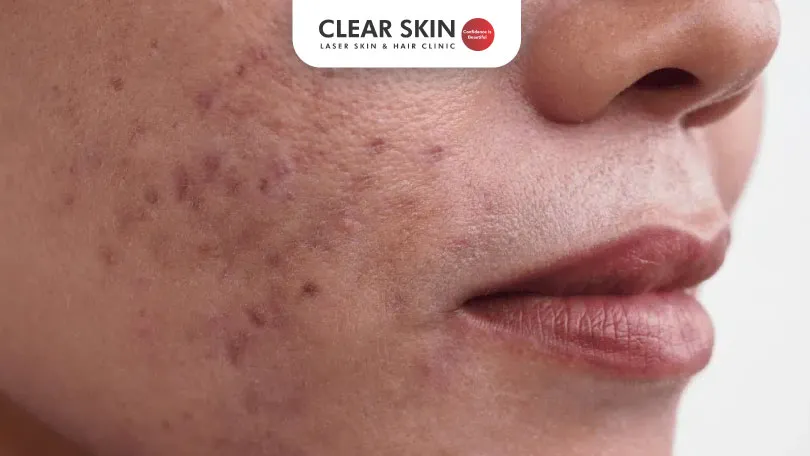What Causes Hyperpigmentation After Acne and How Can It Be Treated?
Reviewed By: Dr Dhananjay chavan
Updated on: 23rd December, 2024

Acne may be gone, but has hyperpigmentation become your new concern? Don’t worry, you’re not alone. Many individuals experience dark spots or patches on their skin even after successfully addressing acne issues.
This article explores why post-acne hyperpigmentation occurs and offers treatment options to help you achieve clearer, even-toned skin.
Table Of Content
- What is Hyperpigmentation After Acne?
- Why Does It Happen?
- How Can Hyperpigmentation Be Treated?
- How Long Does It Take to See Results?
- Tips to Prevent Future Hyperpigmentation
- Conclusion
What is Hyperpigmentation After Acne?
Post-acne hyperpigmentation, also known as post-inflammatory hyperpigmentation (PIH), occurs when your skin produces excess melanin as it heals from acne or a similar skin injury.
Melanin is the pigment that gives your skin its colour. When its production increases, dark spots or patches develop in the affected area, leaving your skin looking uneven or dull.
This condition is often more visible in people with darker skin tones and typically manifests as darkened areas on the skin after acne lesions heal.
Why Does It Happen?
Acne is an inflammatory condition. When your skin undergoes inflammation—whether superficial or in its deeper layers—it tries to heal itself.
During this healing process, pigment-producing cells (melanocytes) are stimulated, resulting in increased melanin production at the site of injury. This leads to hyperpigmentation or the formation of dark spots and patches.
Certain factors can worsen post-acne hyperpigmentation:
- Sun exposure: UV rays stimulate melanin production and can deepen existing pigmentation.
- Picking or squeezing pimples: This increases inflammation, worsening hyperpigmentation.
How Can Hyperpigmentation Be Treated?
The good news is that hyperpigmentation can be treated, although patience and consistency are key. Here are some effective treatment options:
1. Make Sunscreen Your Best Friend
UV rays can worsen pigmentation and stimulate melanin production. Use a broad-spectrum sunscreen with proper SPF daily, whether you’re indoors or outdoors. Reapply it every 2–3 hours for optimal protection.
2. Topical Treatments
There are various creams and gels available to help fade pigmentation:
- Vitamin C: Known to brighten the skin and control melanin production.
- Niacinamide: An anti-inflammatory ingredient that can effectively lighten dark spots.
- Azelaic acid: A gentle acid that helps fade acne marks and improve pigmentation. It may initially cause mild irritation, so consult a dermatologist before use.
- Retinoids: Creams containing retinoic acid boost cell turnover, speeding up the fading of pigmentation. However, retinoids can be strong and require proper guidance from a dermatologist doctor to prevent skin irritation.
3. Chemical Peels
Chemical peels exfoliate the top layer of the skin, helping reduce pigmentation. Dermatologists may recommend peels containing glycolic acid, salicylic acid, lactic acid, or azelaic acid, depending on your skin type and the severity of your pigmentation.
4. Laser Treatments
For deeper or more stubborn pigmentation, laser treatments like fractional lasers or Q-switched lasers can be effective. These treatments target the melanin pigment and help lighten dark spots but must always be carried out under professional supervision.
5. Microneedling
Microneedling stimulates the skin using tiny needles to trigger healing and repair processes, effectively reducing pigmentation over time.
6. Be Cautious with DIY Remedies
Many people use turmeric, aloe vera, or other natural remedies to treat hyperpigmentation. While some may offer mild benefits, their effects are slow, and improper use can sometimes irritate or damage the skin. Always consult a dermatologist before trying at-home remedies.
How Long Does It Take to See Results?
Treating hyperpigmentation requires patience. Results typically take 3 to 6 months and depend on:
- The severity and depth of pigmentation.
- The effectiveness of your chosen treatment method.
- How well you care for your skin (e.g., using sunscreen and following skincare instructions).
Consistent care and adherence to your treatment plan are essential for faster and longer-lasting results.
Tips to Prevent Future Hyperpigmentation
Preventing hyperpigmentation is better than treating it. Follow these tips to avoid further pigmentation issues:
- Don’t pick or squeeze pimples. This reduces inflammation and prevents dark spots from forming.
- Use sunscreen daily, no matter the weather.
- Moisturise regularly to maintain your skin’s health and barrier.
Do You Know?
Roughly 250 Patients Are Treated
Everyday By These Dermatologists
(You are one click away from flawless skin)
Meet Our Dermatologist!
Conclusion
Post-acne hyperpigmentation is a common problem, but it’s treatable with the right approach. By following preventive measures and consulting a dermatologist in Pune for suitable treatments, you can achieve smooth, even-toned, and glowing skin over time.
If you’re struggling with hyperpigmentation, schedule a consultation with a dermatologist at Clear Skin Clinic to tailor a treatment plan specific to your skin’s needs. Take care of your skin, and remember—confidence is beautiful!
Further Reading
Do Acne Scar Removal Creams Really Work?
Discover do acne scar removal creams really work. Learn about the best ingredients and treatments to fade acne scars at Clear Skin Pune
Acne Pustules: How to Get Rid of Pustules?
Learn about causes, symptoms, and treatments from Dr. Dhanraj Chavan.
Is Tretinoin Cream Safe for Melasma? Tips and Usage Guide
Discover how tretinoin cream can safely treat melasma.
Unveiling the Potential of Face Packs for Acne Scars
Discover how homemade and customized face packs can help lighten acne marks and rejuvenate your skin.
Have thoughts? Please let us know
We are committed not only to treating you, but also educating you.






